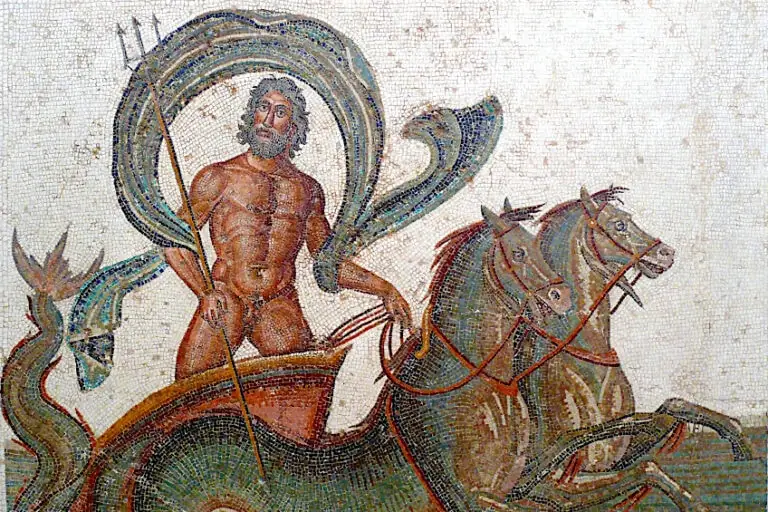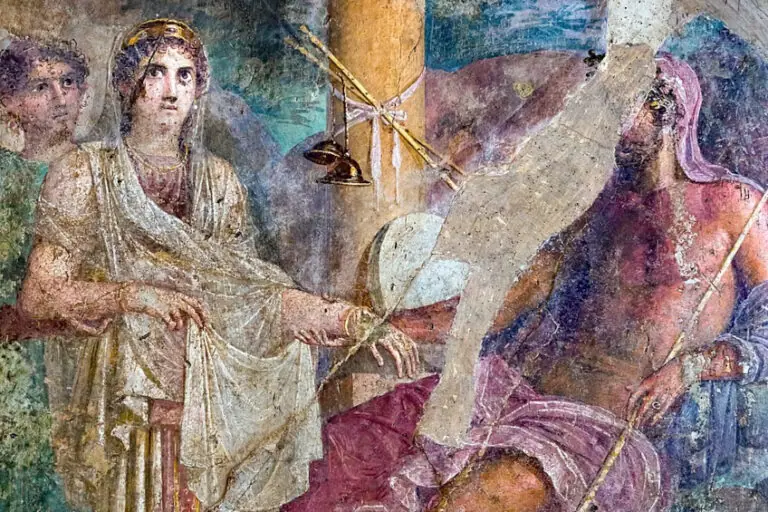Greek God Epimetheus – A Titanic Example of Bad Judgement
Perhaps no god understands humanity’s tendency to act without thinking things through, and the painful lessons in dealing with consequences, quite like the Greek god Epimetheus. This Titan god of afterthought played a vital role in the creation of mankind, as well as the myth explaining the origin of evil. Explore with us the surprising degree of influence this Titan had on the course of humanity in Greek mythology below.
Epimetheus’ Role in Greek Mythology
| Name | Epimetheus |
| Gender | Male |
| God of | Afterthought |
| Personality | Scatter-brained and impulsive |
| Consorts | Pandora |
| Children | Pyrrha, Prophasis, Ephyra, and Metameleia |
| Parents | Iapetus and Cylmene |
The Titan Epimetheus is one known for his foolishness, and his acts in myth were used to explain humanity’s poor circumstances in the world. From explaining our place in the animal kingdom, as beings of handiwork and fire rather than claws and fur, to why evils like sickness haunt a world teeming with immortal gods and monsters, Epimetheus has shaped mankind in several ways across the ages. His myth reflects the values and meaning-making of the time.
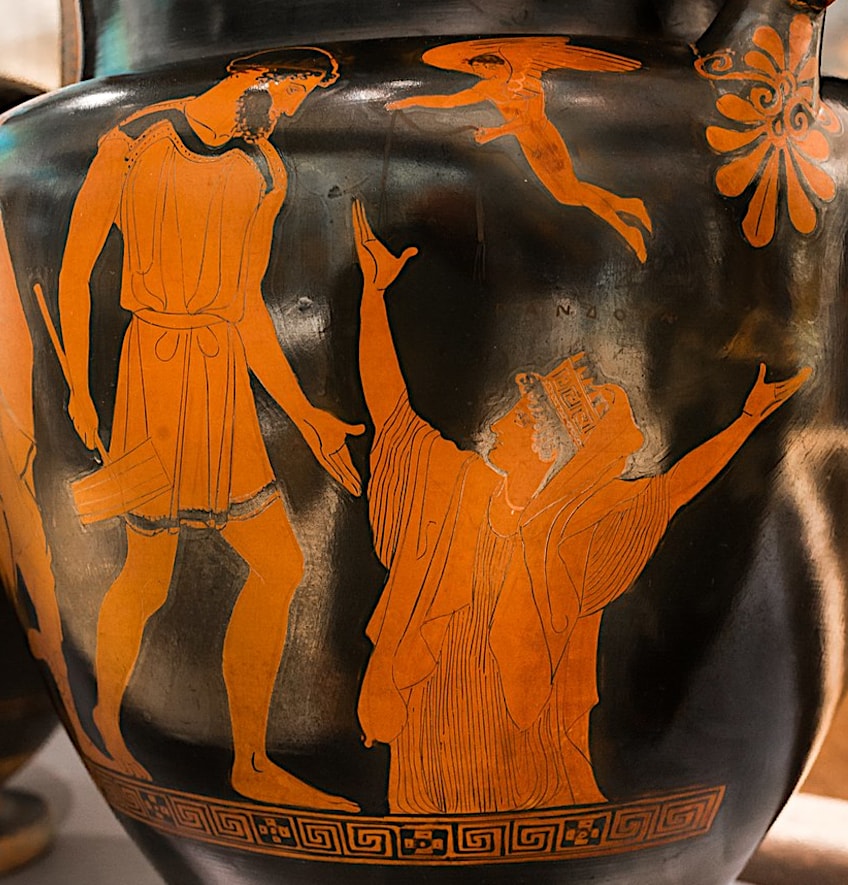 Attic red-figure volute-krater with a depiction of Epimetheus receiving Pandora as she rises from the earth (c. 450 BCE); ArchaiOptix, CC BY-SA 4.0, via Wikimedia Commons
Attic red-figure volute-krater with a depiction of Epimetheus receiving Pandora as she rises from the earth (c. 450 BCE); ArchaiOptix, CC BY-SA 4.0, via Wikimedia Commons
The Titan of Afterthought’s Background and Family
The Greek god Epimetheus is a Titan, one of the pre-Olympian generations of gods in ancient Greek myths. Where he and his myth originated from is unclear, however, Titans often help to explain the origins of, or serve as the embodiment of, certain concepts to the ancient Greeks. Some of their myths and names have been thought adapted from Near East mythology though there is currently little evidence that this is the case with Epimetheus. There is also however very little debate surrounding what Epimetheus means as a name or a mythic figure.
The name Epimetheus comes from combining ‘epí’ (ἐπί) meaning “after,” and the root ‘mēth-‘ (mēth) meaning “to think”, to create a translation of “after-thinking” or “afterthought”.
His role in myth surrounds the trait of poor planning or acting without due thought and the disastrous aftereffects it can have.
 Epimetheus considering the impact of his choices; artist’s impression
Epimetheus considering the impact of his choices; artist’s impression
Epimetheus’ Family Unit
Epimetheus was a son of the Titan Iapetus and his niece and consort Clymene, an Oceanid daughter of the Titans Oceanus and Tethys. Epimetheus is often known in his capacity as the brother of Prometheus, the foolish foil to the famed and clever god of ‘fore-thought’. He is also the brother of the Titans Menoetius and Atlas.
Epimetheus’ only confirmed consort was Pandora.
Pandora was the woman specifically created by the gods as punishment for mankind. She bore Epimetheus a daughter Pyrrha, wife to Deucalion. He is also named by Pindar as fathering a daughter named Prophasis, the personification of excuse.
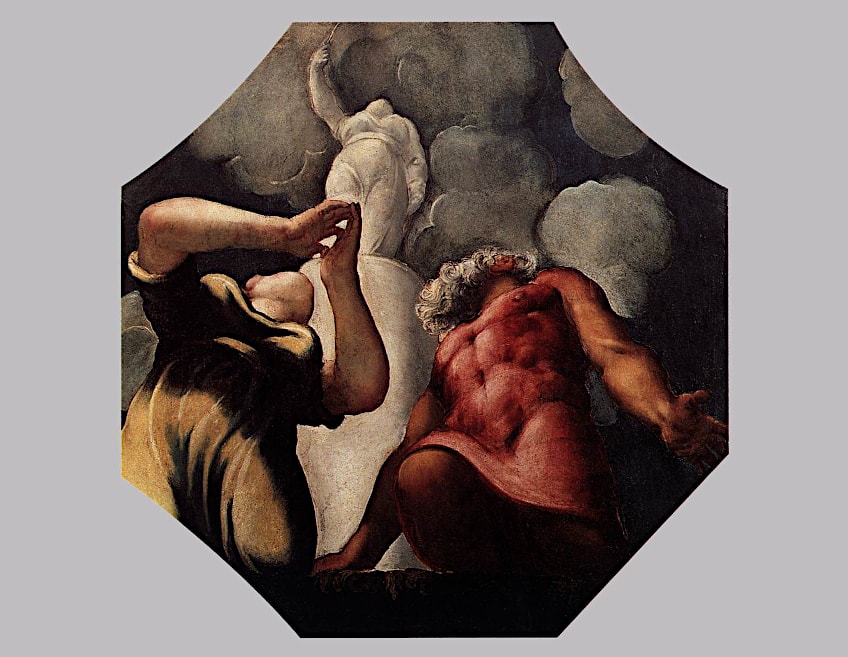 Deucalion and Pyrrha Praying before a Statue of the Goddess Themis by Jacopo Tintoretto (c. 1542); Jacopo Tintoretto, Public domain, via Wikimedia Commons
Deucalion and Pyrrha Praying before a Statue of the Goddess Themis by Jacopo Tintoretto (c. 1542); Jacopo Tintoretto, Public domain, via Wikimedia Commons
Some sources also named him father to two other daughters. Ephyra, an eponymous Oceanid, may have been associated with Pyrrha. Metameleia relates to the sorrow calamity brings to those who do not plan ahead. Her name itself supposedly means “regret of what has occurred” and concerns remorse and changing attitudes towards past actions.
The Greek God Epimetheus’s Significance in Greek Myth
The Greek god Epimetheus and his carelessness play a very interesting role regarding the fate of mankind. During the Titanomachy, he and Prometheus remained neutral and thus unpunished by Zeus following the defeat of the Titans. In Hesiod’s Theogony (8th-7th century BCE), after Prometheus stole fire and art for mankind and was punished, he warned Epimetheus against accepting anything from the Olympians. Despite severely punishing Prometheus, Zeus’ anger towards humans for accepting these divine treasures had not subsided, and he hatched a plan to punish humankind as well.
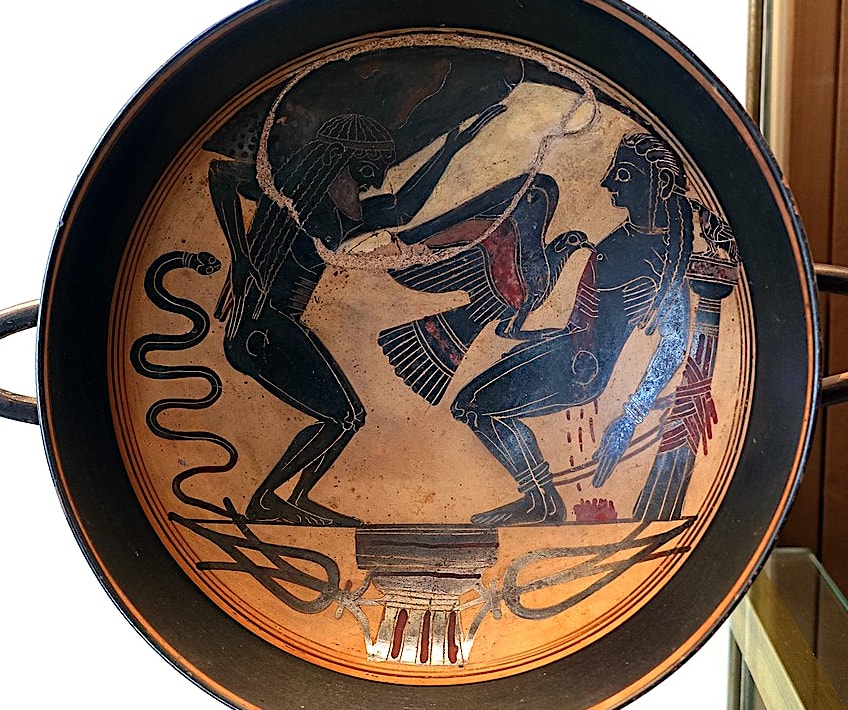 Laconian black-figure kylix with a depiction of the punishment of Atlas and Prometheus by the Arkesilas Painter (560-550 BCE); Daderot, Public domain, via Wikimedia Commons
Laconian black-figure kylix with a depiction of the punishment of Atlas and Prometheus by the Arkesilas Painter (560-550 BCE); Daderot, Public domain, via Wikimedia Commons
Zeus had Hephaestus create an irresistibly beautiful woman whom the gods named Pandora. The Olympians showered her with gifts of beauty, wit, grace, domestic skills, along with less desirable traits such as deceptiveness and cunning. Hermes presented her to Epimetheus as a gift, who accepted her without thought to his brother’s warning. Pandora, whether knowingly or not, famously released all the evils that plague mankind from a ‘pithos’ or jar given to her as a wedding gift by Zeus. In this way, he contrasts his wise brother who championed mankind, by having been a part of their downfall.
Another later myth gives Epimetheus a more direct role in the story of the origin of the human race.
Plato (4th century BCE) wrote that Epimetheus and his brother were tasked with populating the earth with beasts and man. Epimetheus was responsible for distributing attributes given to them by Zeus, and Prometheus would sign off on them and create humans. Epimetheus did well, distributing strength to the large and swiftness to the small, and giving a multitude of advantages from flight to camouflage to class, and so on. Unfortunately, he came to humans and realized he’d given all the attributes away already, leaving humans stranded and defenseless until Prometheus stole the civilizing fire and art for them.
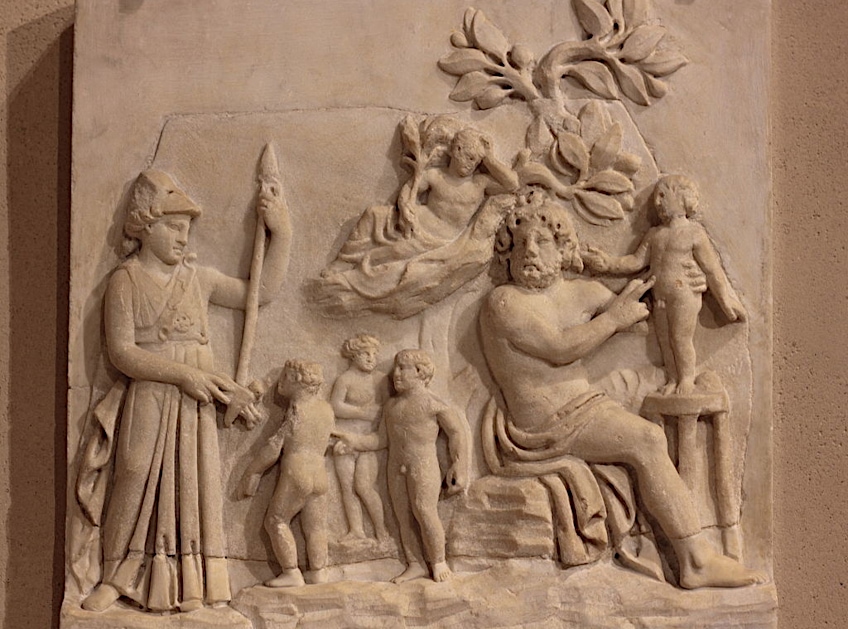 Relief depicting the creation of humanity by Prometheus, overseen by Athena (3rd Century CE); Caroline Léna Becker, CC BY 3.0, via Wikimedia Commons
Relief depicting the creation of humanity by Prometheus, overseen by Athena (3rd Century CE); Caroline Léna Becker, CC BY 3.0, via Wikimedia Commons
In both versions, Epimetheus’ foolishness and lacking the forethought of his brother Prometheus, informed the fate of humanity and doomed them to suffering. Whether it be the origin of the wickedness of women or the ills that dog mankind as mortals. According to a story found in Ovid’s Metamorphosis, this is not his only connection to the fate of humanity, as his daughter Pyrrha and her husband were the only two survivors of the great flood Zeus called to end the Bronze Age. Following the advice of the goddess Themis, they repopulated the earth by throwing stones over their shoulder, with their stones transforming into people of their respective genders.
Epimetheus’s role in myth is characterized as a foolish one, as he did not look before he leapt and thus brought unforeseen consequences to mankind.
According to Hesiod, his ignoring of Prometheus’ warning brought the evil-natured women and the ills that hound men across the earth into existence. Plato’s story as the origin of the gifts given to each animal holds his lack of planning as the more direct reason for the downfall of Prometheus, who had to make do despite his brother’s folly.
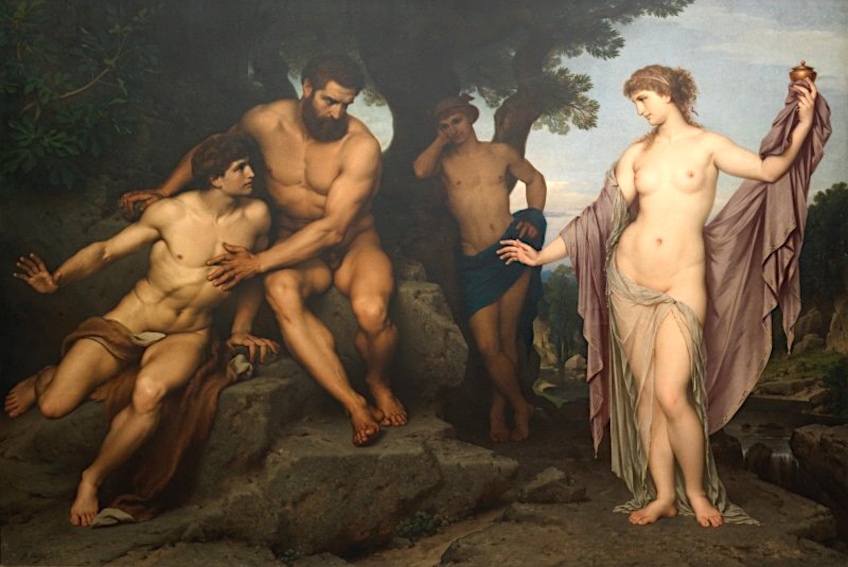 Prometheus and Epimetheus before Pandora by Hermann Julius Schlösser (1878); Hermann Julius Schlösser, Public domain, via Wikimedia Commons
Prometheus and Epimetheus before Pandora by Hermann Julius Schlösser (1878); Hermann Julius Schlösser, Public domain, via Wikimedia Commons
Epimetheus is the god of afterthought, a reconsideration that may be just in time or too late by turn. In a society exalting wit and intelligence, he is naturally cast in an unflattering light. He explains not only the origin of the state of man as they struggle in the world but also some of mankind’s less favorable habits, and the dangers of living life without due consideration.
The god himself is noted by Hesiod as being made wise through the trouble his mistakes cause. Indeed, learning from one’s mistakes requires afterthought and a level of introspection and active dedication that many struggle with today.
Attitudes of the Titan Epimetheus
As Epimetheus has few references in Greek and Roman writings, we have even fewer sources on his characterization in myth. He is named by Hesiod as “scatter-brained” and as the brother of Prometheus is often used to contrast his too-clever and exceedingly sly sibling. His forgetfulness and disorganization have devastating effects, leading him to act without due logical or meticulous consideration. His task of distributing attributes and strengths across the beasts if the earth is marred by his failure to ensure enough for all and leaving humanity defenseless in the world.
 Epimetheus personifies carelessness and lack of judgement; artist’s impression
Epimetheus personifies carelessness and lack of judgement; artist’s impression
His lack of vigilance and his impulsivity in the face of the irresistible poisoned gift Pandora was, only further earned him the ire of mankind. We hear no indication of resentment toward Zeus or that his relationship with Pandora was anything but happy, though whether this speaks to his foolishness or a less serious nature is up for debate.
Worship and Influence of the Titan of Afterthought
Epimetheus has no center of worship or sacred symbols of his own, though this was not uncommon for Titans, who as a group mostly served to answer questions surrounding why things are the way they are and questions of cosmogony. As with his mythos, he is often depicted in conjunction with Pandora, usually in her creation myth or with her jar of sorrows present.
Epimetheus’ role and influence as we know it has been limited to that of a meaning-making narrative for the dual purpose of cosmogony and parable.
The Titan has been an explanation of the ills that plague humanity and how they progressed the way they did, and through the same myths, he is a cautionary tale teaching the value of forethought and stressing the need to avoid his foolish mistakes in one’s own life.
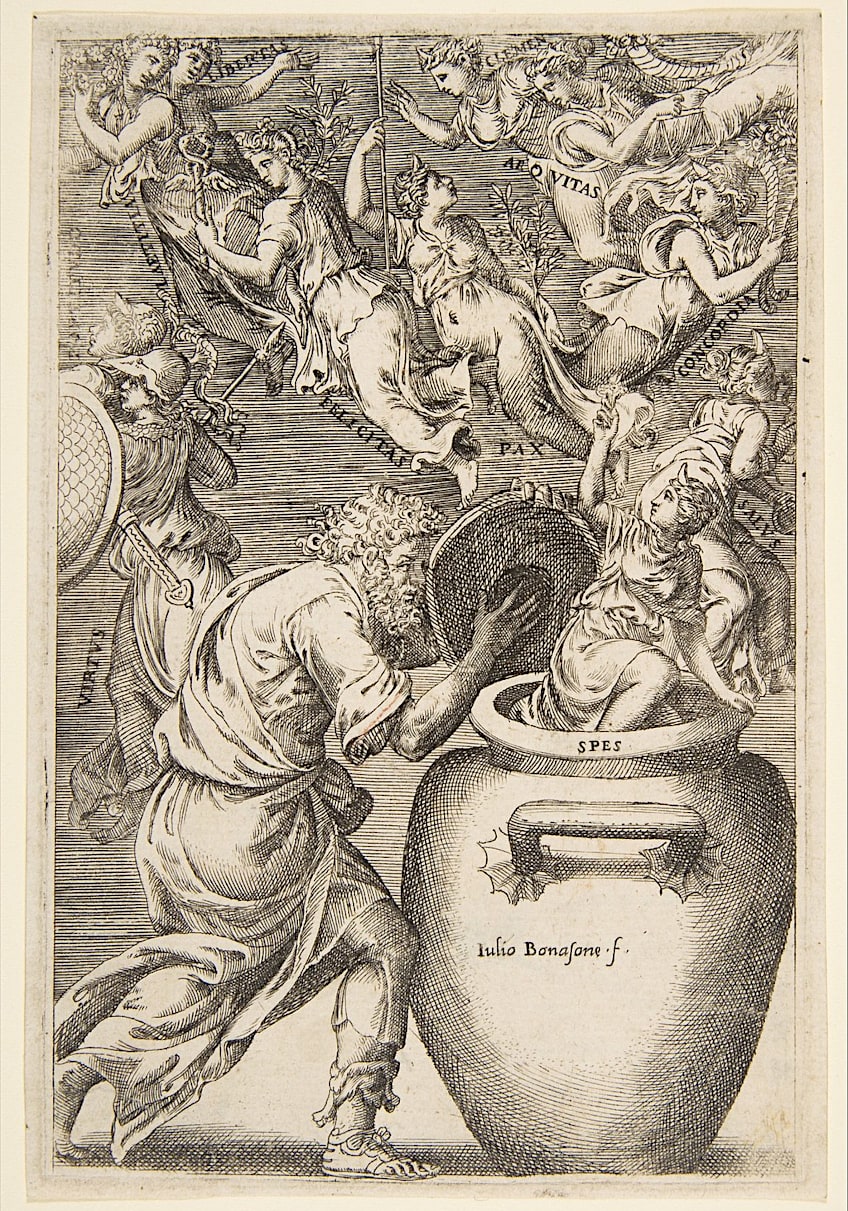 Epimetheus Opening Pandora’s Box by Giulio Bonasone (between 1531-76); Giulio Bonasone, CC0, via Wikimedia Commons
Epimetheus Opening Pandora’s Box by Giulio Bonasone (between 1531-76); Giulio Bonasone, CC0, via Wikimedia Commons
True to form, most modern uses of his legacy relate to academic musings around the tale and its greater implications. Epimetheus and his concept have been used in philosophy and psychology, such as by Carl Jung, and his myth and role in releasing evil into the world have been heavily scrutinized and debated over the centuries.
The Lessons of Epimetheus
If Prometheus is a lesson in being too clever for one’s own good, Epimetheus shows how foolishness is effortless and hindsight is twenty-twenty. His myths teach one how not applying your mind to thoughtful and creative critical thinking can bring catastrophic consequences to ourselves and those around us.
This encourages one to engage in introspection, to reconsider your plans and actions, and examine it for what could be missing.
This is particularly true for moments of emotion where your eagerness might overcome care. Epimetheus either did not think for his desire of Pandora or could not believe such a beautiful woman would cause any harm, and fell for Zeus’ trap. In every action, one can take a moment and reflect on if it is the correct course, and whether it can be added to or improved upon.
The Vital Role of Afterthought
When thinking what is Epimetheus the god of, foolishness may be your first instinct but true to his sphere, thinking deeper makes it clear that afterthought is where this god shines. Hindsight is at its basics us reflecting on the past, but more specifically it is us looking at the past from the perspective of the present.
Thinking back on past events and what you would have done if you knew what you knew now is something we all do.
We do have a tendency to think that the past was more predictable than we thought, and that what we could have done differently is actually what we should have done to avoid the current situation.
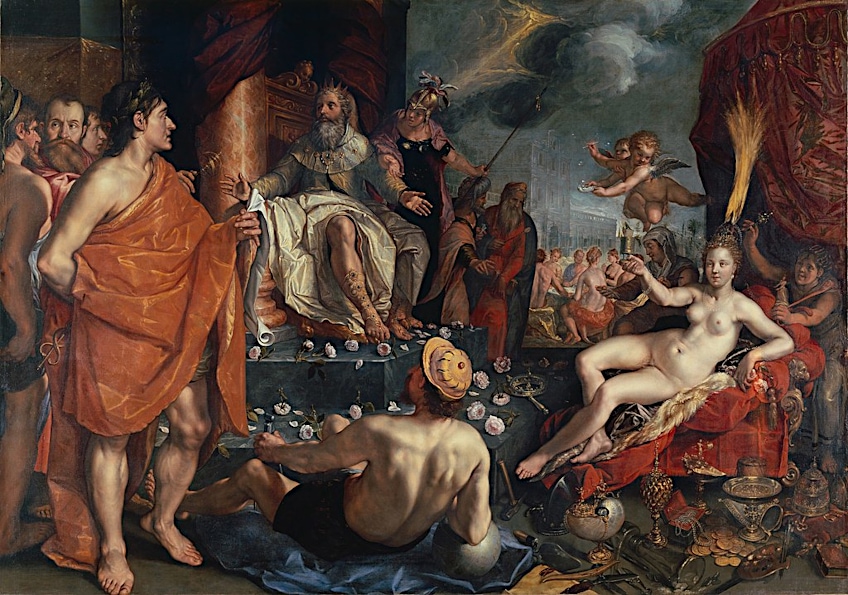 Epimetheus presenting Pandora to King Epimetheus by Hendrik Goltzius (1611); Hendrik Goltzius, Public domain, via Wikimedia Commons
Epimetheus presenting Pandora to King Epimetheus by Hendrik Goltzius (1611); Hendrik Goltzius, Public domain, via Wikimedia Commons
Hindsight can be useful as a learning tool. Epimetheus is said to be made wise by his sorrows, and thinking about how you could have avoided an unpleasant situation certainly encourages you to have more foresight in the future, even if it is just about that specific time. That being said, hindsight is only as useful as you are willing to change your behavior for the better. The true failing of Epimetheus was having been given foresight by his brother and not applying it to his behavior. That being said, hindsight is not specific to bad situations. Looking back on a situation can also reveal that you were correct or at the very least lucky in your choice when you look at the situation with your present knowledge.
We have all had moments where we feel that in hindsight it was not as bad as we thought, or that you actually made the best of a bad situation.
This can be applied to mankind’s situation in Greek myth as well. Without Epimetheus’ blunder leaving us deprived of an advantage in the cruel natural world, Prometheus may not have given us the civilizing ability of art or fire. Humanity may not have progressed to the point where you could read about the Greek gods and their follies and triumphs at all. Where would the human race be if we had claws instead? Where would mankind be without the creation of the first woman Pandora who bore the first woman ever born Pyrrha who in turn repopulated the earth after Zeus’ deluge? These are questions Epimetheus’ stir in our minds, of how mankind came to be and how we can do better and be better prepared.
The Importance of Active Change
Changing for the better does take a conscious and continuous effort, however, as shown by Epimetheus not learning the first time around, but it should surely be worth it.
Epimetheus is also known as the father of excuse, an intriguing concept as an excuse often seeks to free someone from blame in some offense or failure.
One can find excuses through afterthought, though it can both be a logical reasoning for your actions or a creative way to shirk responsibility for failing. Either one requires looking back at what you have and could have done and whether or not you can deal with the resulting situations. Afterthought allows you to think back on the past but whether you use that constructively to learn from it and do better next time is a choice only you can make. Keep in mind that the entire enterprise of recording and studying history is a category of afterthought.
 The recording and study of historical events as positive aspects of afterthought; artist’s impression
The recording and study of historical events as positive aspects of afterthought; artist’s impression
The Parable of Epimetheus
Epimetheus’ story is a showcase of humanity’s least favorite traits and habits, our lacking strength and vulnerability to sickness, our tendency to thoughtlessness in the face of distraction, and our struggles with gender norms. We, unlike Epimetheus at the time, have the benefit of hindsight and the opportunity to learn from his mistakes should we only think to take it. We shall never know the alternative histories where Epimetheus did things differently, but the legacy of Epimetheus is alive in all of us as we muse upon his actions and their consequences.
 Understanding catastrophic events requires the distance of time and place; artist’s impression
Understanding catastrophic events requires the distance of time and place; artist’s impression
Epimetheus is also known as the father of excuse, an intriguing concept as an excuse often seeks to free someone from blame for some offense or failure. One can find excuses through afterthought, though it can both be a logical reasoning for your actions or a creative way to shirk responsibility for failing. Either one requires looking back at what you have and could have done and whether or not you can deal with the resulting situations. What you do with afterthought, either introspection or excuse, requires a conscious decision about what you want to be. Afterthought allows you to think back on the past but whether you use that constructively to learn from it and do better next time is a choice only you can make.
The Titan Epimetheus is a foolish god in Greek mythology whose actions were believed to have shaped humanity in several ways. He is a popular figure, though not exactly well-liked, for his part in explaining why humanity suffers in the world and the progression of mankind as the ancient Greeks knew it. Epimetheus has served as a cautionary tale for centuries as well as a pivotal figure in myth. The Titan’s story graces us with an intriguing look into ancient Greek thought and values that we could not help but explore.
Frequently Asked Questions
What Does Epimetheus Mean?
Epimetheus is a name constructed using a combination of the Greek word ‘epí’ (ἐπί) that means after, and the root word ‘mēth-‘ (mēth) which means to think. The name Epimetheus is thus taken to mean after-thinking, which is translated to afterthought, or more loosely to hindsight. This harkens back to his role as the foolish foil to the cunning and wise Prometheus.
What Is Epimetheus the God Of?
Epimetheus is the Titan god who was believed by the ancient Greeks to embody the concept of afterthought, explaining the origin of humanity’s foolishness and tendency for hindsight. Epimetheus was considered the foolish brother of Prometheus, and his role as a creator of mortal creatures was used to highlight the importance of forethought, while his relation to Pandora and the unleashing of ills on mankind displayed the value of hindsight.
What Was the Role of Epimetheus?
The Titan Epimetheus embodied the concept of hindsight. He and Prometheus were representatives of humanity, and his foolish actions were the catalyst for several of humanity’s less desirable traits. He helped explain the creation of man and womankind, through his wife Pandora and their daughter Pyrrha, as well as the origin of the evils we suffer from such as sickness and death.

I am deeply passionate about history and am constantly fascinated by the rich and complex stories of the past. As the editor-in-chief of learning-history.com, I have the opportunity to share this passion with a wide audience through the creation and distribution of engaging and informative content about historical events, persons, and cultures. Whether it’s through writing articles and blog posts or creating videos or podcasts, I strive to bring the past to life in a way that is both accurate and enjoyable. My expertise in history, combined with my strong writing and communication skills, allows me to effectively communicate complex historical concepts and make them accessible and interesting to a wide range of readers. I am truly grateful for the opportunity to share my love of history with others through my work on learning-history.com.



